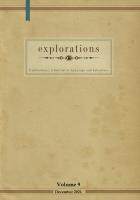Moving Beyond Appalachia: Social Mobility in J. D. Vance’s Hillbilly Elegy: A Memoir of a Family and Culture in Crisis
Moving Beyond Appalachia: Social Mobility in J. D. Vance’s Hillbilly Elegy: A Memoir of a Family and Culture in Crisis
Author(s): Hatice BaygutalpSubject(s): Language and Literature Studies
Published by: Uniwersytet Opolski
Keywords: Appalachia; the Hillbilly stereotype; white trash; working-class whites; class mobility; American dream; mobility studies
Summary/Abstract: This paper examines J. D. Vance’s memoir Hillbilly Elegy: A Memoir of a Family and Culture in Crisis (2016a), hereafter HE, as a narrative of upward mobility, which invokes Vance himself as a hillbilly character, who achieves to move out from the secluded Appalachian cities of Middletown, Ohio and Jackson, Kentucky to the more symbolically, intellectually and socio-economically central and emancipating settings such as the US Marine Corps, Ohio State University, Yale Law School and Silicon Valley investment firm. I will discuss how Vance offers a rugged, alienating, and agitated reading of his mobility and thereby complicates, deepens, and adds new angles to the concept of mobility. At the same time, I will analyze how Vance’s memoir asserts the capability of a hillbilly to be an economically, socially, and intellectually mobile subject, steering his destiny. Namely, Appalachians are not necessarily the stagnant and regressive other of white America as they can exist beyond the “poor, backward, lazy, violent and alcoholic” hillbilly stereotype. Thus, Vance, to some extent, achieves to show that the gap between the upper-class urban US and working-class rural Appalachia can be bridged. Ultimately, with specific attention to Vance’s mobility and the direct confrontation of discourses of poor white trash, hillbilly and Appalachia, this article reveals how Vance’s memoir marks a significant and unique attempt to complicate the pathological elements of the region’s master-images and show how poor white people should be viewed with the potency to move and venture beyond the prescribed boundaries of the worlds to which they are bound.
Journal: Explorations: A Journal of Language and Literature
- Issue Year: 2021
- Issue No: 9
- Page Range: 8-18
- Page Count: 11
- Language: English

